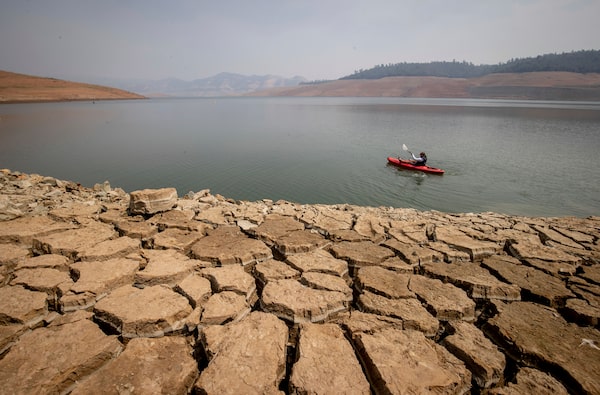
A kayaker paddles in Lake Oroville as water levels remain low due to drought conditions in Oroville, Calif., on Aug. 22, 2021.Ethan Swope/The Associated Press
Climate scientists have long warned that the world is not on track to prevent the average global temperature from rising more than 1.5 degrees above preindustrial levels – a best-case threshold specified by the 2015 Paris climate agreement.
Now, a UN report that offers the latest and most comprehensive review yet of the effects of climate change has found a similar disconnect in countries’ lack of preparedness to cope with the threats posed by a failure to reduce greenhouse-gas emissions.
Those threats include direct effects on health because of extreme heat, malnutrition, infectious disease and displacement; risks posed by damage to cities and infrastructure; and longer-term problems caused by stress to ecosystems on land and in oceans.
According to the report, the world needs to accelerate its efforts to both prepare for and limit climate change or face progressively deteriorating living conditions for millions of people.
“Any further delay … on adaptation and mitigation will miss a brief and rapidly closing window of opportunity to secure a liveable and sustainable future for all,” the report’s authors conclude.
Representatives from 195 countries, including Canada, have signed off on the report released on Monday by the UN’s Intergovernmental Panel on Climate Change (IPCC).
Included among the report’s key messages:
- Climate change is already having a negative impact on people’s lives, infrastructure and economies in every region of the globe;
- Climate change is detrimental to nature’s contributions to human well-being, including food and water;
- Those who are likely to be the most affected by climate change are also the most socio-economically disadvantaged, whether it is within communities or among countries;
- The need for worldwide action to build climate resilience is more urgent than previously thought;
- Around the world, most efforts to adapt to climate change remain in the planning stage.
Ko Barrett, a vice-chair of the IPCC and senior adviser for climate at the U.S. National Oceanic and Atmospheric Administration, said that policy makers should look at the report as a road map for developing and implementing solutions to buy time as the world shifts to a more sustainable energy future.
“It really reinforces the main findings that are emerging from all of our reports this cycle, which you could simply state as: Every fraction of a degree of warming matters and every action helps,” she said.
The report, which involved the work of 270 authors, is the second in recent months to provide a detailed assessment of the current state of knowledge about climate change.
The first report, published last August, found that the main causes of climate change can now be attributed unequivocally to human activity. A third report, set for release later this spring, will consider the emissions targets that the global community will need to meet in order to achieve the goals of the Paris agreement.
But it is this second report that is likely to hit closest to home for those who are already feeling the consequences of climate change.

Damage caused by heavy rains and mudslides along the Coquihalla Highway, near Hope, B.C., on Nov. 18, 2021.JONATHAN HAYWARD/The Canadian Press
This past year, that would include British Columbians who experienced a sequence of extreme-weather events that included record heat, severe wildfires and devastating mudslides and floods, said Linda Mortsch, a co-ordinating author on the report’s chapter dealing with North America.
The related chain of disasters is a textbook illustration of the “interacting, cumulative and cascading effects” that are increasingly expected as the planet warms, added the researcher, who is a member of the University of Waterloo’s Interdisciplinary Centre on Climate Change.
Sherilee Harper, who was also an author on the North America chapter, said that while adapting to more severe effects in the future is essential, such efforts will ultimately be undermined if they do not go hand in hand with more serious measures to slow the pace of climate change.
“There’s certainly feasible adaptation options that are available and that have been proven by research to reduce risk. But the effectiveness of those strategies definitely decreases with warming,” said Dr. Harper, who is an associate professor of public health at the University of Alberta.
In addition to geographic regions, the report provides a detailed assessment of the effects of climate change on water, agriculture, cities, health and other sectors. It also features a series of “cross-chapter” spotlights on specific areas including one for polar communities, which are experiencing warming at a faster rate than the global average. As a result, sea-ice loss, permafrost thaw and a reduction in food security have raised risk levels in these communities.

A person looks at wildfires tearing through a forest in the region of Chefchaouen, in northern Morocco, on Aug. 15, 2021.FADEL SENNA/AFP/Getty Images
Jackie Dawson, a University of Ottawa researcher who was among the authors of the polar section, noted that even if Canada and other countries manage to meet their net-zero goals, a lag effect in the way the Earth’s atmosphere warms means that temperatures in the North will continue to rise for many years to come.
“Because of this fact, it is vital that we prepare by investing in adaptation measures that are purposefully designed to support our economic structures, infrastructure, cultures and livelihoods,” Dr. Dawson said.
Yet there is ample evidence in the report that some of the places in the world that require climate adaptation measures the most are currently being supported the least.
Eddy Perez, an expert on climate diplomacy with advocacy organization Climate Action Network Canada, noted one key difference in the report relative to the past IPCC assessment in 2014. It is the detailed view it presents of the disproportionate effect that climate change is having on Indigenous peoples around the world and other marginalized communities.
“This report says we need to do it differently,” he added.
Adam Fenech, director of the University of Prince Edward Island’s Climate Research Lab, said that he agrees with the report’s conclusions. However, he was concerned that its language – carefully negotiated by member countries of the IPCC – would not be strong enough to spur the public and world leaders toward more decisive action on climate change, rendering the document “impotent.”
“This really needs to be where the rubber meets the road,” Dr. Fenech said.
Interested in more stories about climate change? Sign up for the Globe Climate newsletter and read more from our series on climate change innovation and adaption.
 Ivan Semeniuk
Ivan Semeniuk